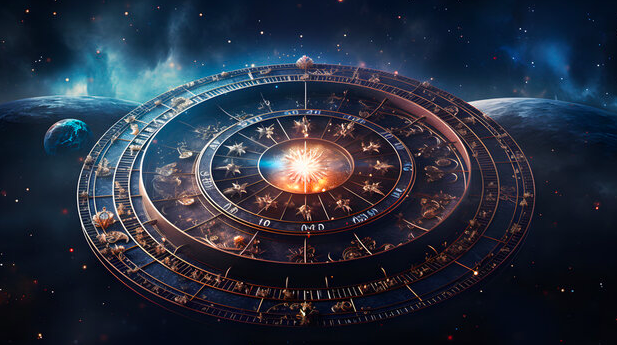What Is Vedic Astrology as per Vedānta?
1. Jyotiṣa: The Eye of the Vedas
Vedic astrology called Jyotiṣa (ज्योतिष) – is one of the six Vedāṅgas (limbs of the Veda). It literally means “light” or “divine illumination.”
In the context of Vedānta, Jyotiṣa is not merely a predictive science – it is a spiritual tool that reveals the karma and evolutionary path of the soul in this lifetime.
Vedānta says: You are not the body or mind; you are the Self (Ātman), which is pure awareness.
But as long as avidyā (ignorance) persists, the Self identifies with the body and is reborn under the influence of karma.
Jyotiṣa helps illuminate this karmic imprint.
2. Birth Chart (Janma Kundali) = Karmic Blueprint
Your birth chart is a snapshot of the cosmic conditions at the exact time and place of your birth. From a Vedāntic perspective, this is not random. It is precisely aligned with your soul’s karmic debts, desires, and lessons.
Just as the body is chosen based on karmic tendencies, so is the planetary configuration.
“यथाकर्म यथाश्रुतं” – As per karma, as per knowledge.
–Chāndogya Upaniṣad 5.10.7
Your chart reflects:
- Past-life tendencies (vāsanās)
- Unresolved karma (sanchita and prārabdha)
- Emotional patterns, ego struggles, spiritual potential
- Areas of suffering and transformation
How Do Planets Influence a Person?
Each planet (graha, literally “seizer”) governs not just events, but deep psychological and karmic energies. They influence how you experience life – not by controlling you, but by mirroring your inner state.
Here’s how each major planet functions spiritually and karmically:
| Planet | Karmic/Spiritual Influence | Vedāntic Insight |
|---|---|---|
| Sun (Surya) | Ego, identity, soul purpose, confidence | Represents Atman (Self) when purified |
| Moon (Chandra) | Mind, emotions, memory, mother karma | Reflects your manas (mind) and chitta (emotional karma) |
| Mars (Mangal) | Action, anger, willpower, courage | Teaches right use of energy and non-violence |
| Mercury (Budha) | Intellect, speech, adaptability | Tests clarity of discrimination (viveka) |
| Jupiter (Guru) | Wisdom, expansion, dharma, teachers | Divine grace, the path to jnāna |
| Venus (Shukra) | Desire, pleasure, love, sensual karma | Lessons around detachment and refinement |
| Saturn (Shani) | Delay, discipline, suffering, karma | Master of prārabdha karma; leads to humility and maturity |
| Rahu | Obsession, illusion, foreign experiences | Drives you to transcend material illusion |
| Ketu | Detachment, loss, spirituality, past-life mastery | Dismantles ego, often through suffering or isolation |
Karma, Grahas, and the Spiritual Journey
1. You’re Not Being Punished – You’re Being Shown
If Saturn causes delay, or Rahu causes confusion, it’s not punishment. It’s a mirror of where the soul has clung to illusion, fear, or pride in past lives.
Vedānta explains:
Suffering arises not because of the planet itself, but because the ego resists the lesson the planet brings.
2. Mahādasha and Transits = Timing of Karmic Activation
In Jyotiṣa, Mahādashās (planetary periods) and Gocharas (transits) activate different karmas. When Saturn’s period begins, you may face loss, isolation, or duties – but these are your spiritual accelerators.
What appears as restriction is often a gateway to mokṣa (liberation).
How Jyotiṣa Serves the Vedāntic Path
In Vedānta, the ultimate goal is Self-realization – to go beyond karma, body, and birth.
Jyotiṣa helps this by:
- Pointing out attachments to be dropped
- Highlighting life lessons for growth
- Offering timing for sādhana, study, and withdrawal
- Helping seekers choose favorable windows for spiritual retreats, vows, pilgrimages, etc.
“ज्ञानं योगेन संयुतं” – “When astrology is united with knowledge and discipline, it becomes a path to liberation.”
Final Realization
You are not at the mercy of planets.
You are not your karma.
You are the witness of karma – the Self.
The planets guide your outer journey, but Vedānta shows the way home – inward, to the unchanging, eternal awareness that no planet can touch.
“अहमात्मा गुडाकेश सर्वभूताशयस्थितः।”
“I am the Self, seated in the hearts of all beings.” – Bhagavad Gītā 10.20


Leave a Reply